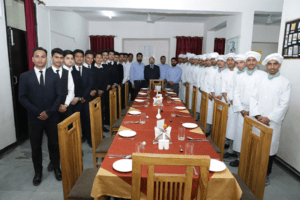Hospitality French- Bachelor of Hotel Management and Catering Technology (BHMCT) is a degree program that focuses on various aspects of the hospitality industry, including hotel management, catering, and tourism. While French is not typically a mandatory part of the curriculum for BHMCT programs, it can be a valuable skill for individuals pursuing a career in the hospitality industry, especially if they plan to work in international settings or with French-speaking clients.
Here’s how French might be relevant to a BHMCT program:
- International Guests: Many hotels and restaurants cater to international guests, including those from French-speaking countries. Being able to communicate with these guests in their native language can enhance the guest experience and improve customer satisfaction.
- Fine Dining: French cuisine is renowned worldwide for its excellence. If you aspire to work in fine dining establishments or Michelin-starred restaurants, knowledge of French culinary terms and techniques can be invaluable.
- Travel and Tourism: French is one of the most widely spoken languages in the world. If you work in the tourism sector, having some proficiency in French can help you cater to French-speaking tourists and provide them with a more personalized experience.
- Career Opportunities: Some luxury hotels and resorts with international clientele may require employees who can speak multiple languages, including French. Having this skill can open up more job opportunities in such establishments.
- Networking: In the hospitality industry, networking is essential. Knowing French can help you connect with colleagues, suppliers, and business partners from French-speaking regions, potentially leading to collaborations and career growth.
If you are interested in incorporating French into your BHMCT education, consider the following options:
- Language Courses: Enroll in French language courses either as part of your degree program or separately through language institutes.
- Online Resources: Utilize online resources, such as language learning apps, websites, and videos, to learn and practice French.
- Language Immersion: Consider participating in language immersion programs or internships in French-speaking countries to gain practical experience and improve your language skills.
- Cultural Understanding: Learning the French language also involves understanding French culture and etiquette, which can be valuable when dealing with French-speaking guests.
While French may not be a mandatory requirement for BHMCT programs, it can certainly enhance your skill set and make you more competitive in the global hospitality industry, especially if you have aspirations of working in upscale or international settings.
What is Hospitality French
“Hospitality French” typically refers to the use of the French language in the context of the hospitality industry. It involves learning and using the French language for various purposes related to hospitality and tourism, such as interacting with French-speaking guests, understanding French culinary terms, and providing a more personalized and effective service to French-speaking customers.
Here are some key aspects of “Hospitality French”:
- Communication: In the hospitality industry, effective communication is essential. Learning French allows hospitality professionals to communicate with French-speaking guests, addressing their needs, answering questions, and providing assistance.
- Customer Service: When serving French-speaking customers, using their language can greatly enhance the customer service experience. It can make guests feel more comfortable and valued during their stay or dining experience.
- Culinary Terms: For those working in restaurants, understanding French culinary terms is crucial. French cuisine is renowned worldwide, and many culinary techniques and dishes have French names. Knowing these terms can be valuable in the kitchen and when explaining dishes to guests.
- Cultural Understanding: Learning French also involves gaining insight into French culture and etiquette, which is important when dealing with guests from France or other French-speaking regions. Understanding cultural norms can help hospitality professionals provide a more culturally sensitive and respectful service.
- Career Opportunities: Having proficiency in French can open up career opportunities in hotels, restaurants, and other hospitality establishments that cater to international guests. Some luxury hotels and resorts prefer employees who can speak multiple languages, including French.
- Tourism: In regions where tourism is a significant industry, knowing French can be an asset for tour guides, travel agents, and hospitality professionals who interact with tourists from French-speaking countries.
To learn Hospitality French, individuals can pursue language courses that specifically focus on the vocabulary and language skills relevant to the hospitality and tourism sectors. These courses may cover topics like making reservations, taking orders, providing recommendations, and handling common guest requests.
Overall, Hospitality French is about using the French language as a tool to enhance the guest experience and improve communication in the hospitality industry, particularly when dealing with French-speaking clientele.
Application of Hospitality French

A Bachelor of Hotel Management and Catering Technology (BHMCT) with a specialization or knowledge of Hospitality French can open up various career opportunities in the hospitality industry, especially if you are interested in working with French-speaking guests or in international settings. Here are some applications and career paths for BHMCT graduates with expertise in Hospitality French:
- Hotel Management: As a hotel manager or executive, you may oversee the daily operations of hotels and resorts that cater to international clientele, including French-speaking guests. Your knowledge of French can help you communicate effectively with these guests, handle their special requests, and create a welcoming environment.
- Front Office Management: Working in the front office of a hotel, you’ll interact directly with guests during check-in, check-out, and throughout their stay. Proficiency in Hospitality French can enhance the guest experience and resolve any language-related issues.
- Food and Beverage Management: In restaurants and food and beverage establishments, understanding French culinary terms and providing recommendations in French can be a significant advantage. You may also work in fine dining establishments with French cuisine.
- Catering and Event Management: Planning and managing events, conferences, and banquets often involve coordinating with clients from various backgrounds. Your ability to communicate in French can be an asset when dealing with French-speaking event organizers or clients.
- Tourism and Travel: If you work in the tourism sector, such as a tour guide or travel agent, your knowledge of Hospitality French can help you provide personalized services to French-speaking tourists, create tailored itineraries, and facilitate smooth travel experiences.
- International Resorts and Cruise Ships: Many international resorts and cruise ships hire staff with language skills to cater to diverse guests. You might find opportunities to work on cruise ships that visit French-speaking regions or at resorts with a global clientele.
- Language Training: If you become highly proficient in both hospitality management and French, you could consider a career as a language trainer, teaching hospitality professionals how to communicate effectively in French.
- Consulting and Advising: With your expertise in hospitality management and knowledge of French, you might work as a consultant or advisor to help hotels and restaurants improve their services for French-speaking guests.
- Corporate Roles: Some international hotel chains and hospitality companies have corporate offices where language skills are valued. You could work in roles related to international marketing, guest services, or quality assurance.
- Entrepreneurship: If you have a strong entrepreneurial spirit, you might consider opening your own hospitality-related business, such as a boutique hotel, restaurant, or travel agency, with a focus on attracting French-speaking customers.
Remember that the specific career opportunities available to you will depend on your overall qualifications, skills, and experiences. Proficiency in Hospitality French can certainly enhance your career prospects in the hospitality industry, especially in settings where French-speaking guests and clients are common.
Case Study on Hospitality French
Enhancing Guest Satisfaction at a Luxury Resort
Background: Sarah, a recent graduate with a BHMCT degree specializing in Hospitality French, is hired as the Assistant Front Office Manager at a luxury beachfront resort in a popular tourist destination. The resort attracts a diverse international clientele, including a significant number of French-speaking guests.
Challenge: The resort has received feedback from previous guests, both positive and negative, regarding language barriers. While many guests appreciate the exotic experience of staying at an international resort, some have faced challenges communicating their needs and preferences due to the language barrier. The management recognizes the need to improve guest satisfaction, especially for French-speaking guests.
Solution: Sarah is assigned the task of improving guest satisfaction, particularly for the French-speaking clientele. She leverages her BHMCT Hospitality French skills in the following ways:
- French Language Training: Sarah conducts regular training sessions for the front office staff to improve their basic French language skills. This includes greeting guests in French, understanding common requests, and providing directions in French.
- French Welcome Package: Sarah creates a welcome package for French-speaking guests that includes information about resort facilities, local attractions, and dining options, all available in French. This helps guests feel more comfortable and informed.
- Multilingual Concierge Service: Sarah establishes a multilingual concierge service at the resort. This service ensures that guests have access to assistance in their preferred language, including French. This helps guests with restaurant reservations, tour bookings, and local recommendations.
- French Dining Experience: Sarah collaborates with the resort’s culinary team to create a special French-themed dining experience. This includes a French menu, wine pairings, and a French-speaking server. It becomes a popular choice among guests.
- Guest Feedback: Sarah actively collects feedback from French-speaking guests to understand their needs better. She uses this feedback to make continuous improvements in communication and service quality.
Results: After implementing these initiatives, the resort experiences several positive outcomes:
- Improved Guest Satisfaction: French-speaking guests express higher satisfaction levels, and the resort receives positive reviews highlighting the improved communication and personalized services.
- Higher Occupancy Rates: The resort attracts more French-speaking guests due to its reputation for accommodating their needs. This leads to increased occupancy rates.
- Repeat Business: Many French-speaking guests return to the resort for subsequent vacations, leading to higher repeat business and brand loyalty.
- Positive Word-of-Mouth: Satisfied French-speaking guests recommend the resort to their friends and family, resulting in increased bookings.
- Competitive Advantage: The resort gains a competitive edge in the market by offering superior services for international guests, including those who prefer French.
This case study demonstrates how a BHMCT graduate with expertise in Hospitality French can significantly impact guest satisfaction and contribute to the success of a luxury resort catering to a diverse international clientele. By addressing language barriers and tailoring services to the needs of French-speaking guests, the resort enhances its reputation and profitability.
White paper on Hospitality French
Creating a comprehensive white paper on “BHMCT Hospitality French” would involve an in-depth exploration of the subject, including its significance in the hospitality industry, its applications, and its potential impact on career opportunities. Below, I’ll outline the key sections and provide a brief overview of what each section could include in a white paper on this topic:
Title: Enhancing Guest Experience: The Role of BHMCT Hospitality French
Abstract: A brief summary of the white paper’s key points and findings.
1. Introduction
- Explanation of BHMCT and its significance in the hospitality industry.
- Introduction to the concept of “Hospitality French.”
2. The Importance of Language in Hospitality
- The role of effective communication in the hospitality industry.
- The challenges posed by language barriers in serving international guests.
3. BHMCT Hospitality French: An Overview
- Definition and scope of BHMCT Hospitality French.
- The inclusion of French language courses in BHMCT programs.
4. Applications of BHMCT Hospitality French
- How knowledge of Hospitality French can benefit hospitality professionals.
- Case studies illustrating the application of Hospitality French in real-world scenarios.
5. Career Opportunities
- Exploration of career paths for BHMCT graduates with expertise in Hospitality French.
- Profiles of professionals who have leveraged their language skills in successful careers.
6. Language Training in BHMCT Programs
- An overview of language training within BHMCT curriculum.
- Discussion of effective teaching methodologies for Hospitality French.
7. Preparing Graduates for the Global Market
- How BHMCT programs equip graduates with the skills needed for international hospitality careers.
- The role of cultural sensitivity in hospitality.
8. Case Studies
- Detailed case studies showcasing the impact of Hospitality French in various hospitality settings.
9. Industry Trends and Outlook
- Discussion of emerging trends in the hospitality industry, including the demand for multilingual professionals.
- Future prospects for graduates with expertise in Hospitality French.
10. Conclusion
- Summarization of key takeaways.
- The importance of language skills in fostering guest satisfaction and career success.
11. Recommendations
- Suggestions for institutions offering BHMCT programs on how to enhance language training.
- Recommendations for hospitality professionals seeking to improve their language skills.
12. References
- Citations and references to academic sources, industry reports, and case studies.
Appendices (Optional)
- Additional resources, such as language learning tools and contact information for language training programs.
A comprehensive white paper on BHMCT Hospitality French should provide a thorough understanding of the subject, its relevance in the hospitality industry, and the potential benefits it offers to both students and professionals in the field. Additionally, including real-world case studies and practical recommendations can make the white paper a valuable resource for institutions, educators, and individuals interested in this specialized field of study.






